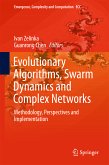The book you hold in your hands is the outcome of the "2014 Interdisciplinary Symposium on Complex Systems" held in the historical city of Florence. The book consists of 37 chapters from 4 areas of Physical Modeling of Complex Systems, Evolutionary Computations, Complex Biological Systems and Complex Networks. All 4 parts contain contributions that give interesting point of view on complexity in different areas in science and technology. The book starts with a comprehensive overview and classification of complexity problems entitled Physics in the world of ideas: Complexity as Energy" , followed by chapters about complexity measures and physical principles, its observation, modeling and its applications, to solving various problems including real-life applications. Further chapters contain recent research about evolution, randomness and complexity, as well as complexity in biological systems and complex networks. All selected papers represent innovative ideas, philosophical overviews and state-of-the-art discussions on aspects of complexity. The book will be useful as an instructional material for senior undergraduate and entry-level graduate students in computer science, physics, applied mathematics and engineering-type work in the area of complexity. The book will also be valuable as a resource of knowledge for practitioners who want to apply complexity to solve real-life problems in their own challenging applications.
Dieser Download kann aus rechtlichen Gründen nur mit Rechnungsadresse in A, B, BG, CY, CZ, D, DK, EW, E, FIN, F, GR, HR, H, IRL, I, LT, L, LR, M, NL, PL, P, R, S, SLO, SK ausgeliefert werden.









